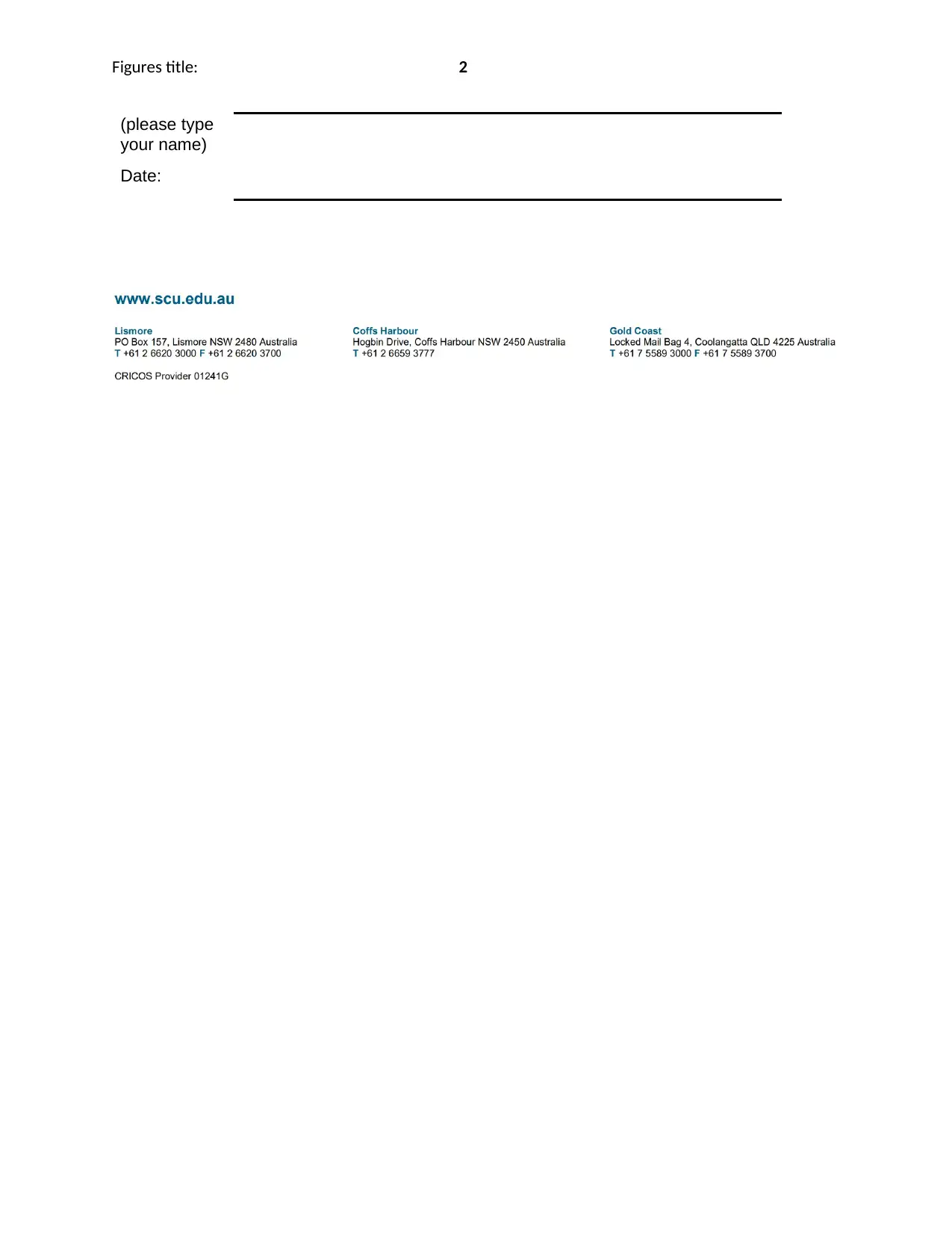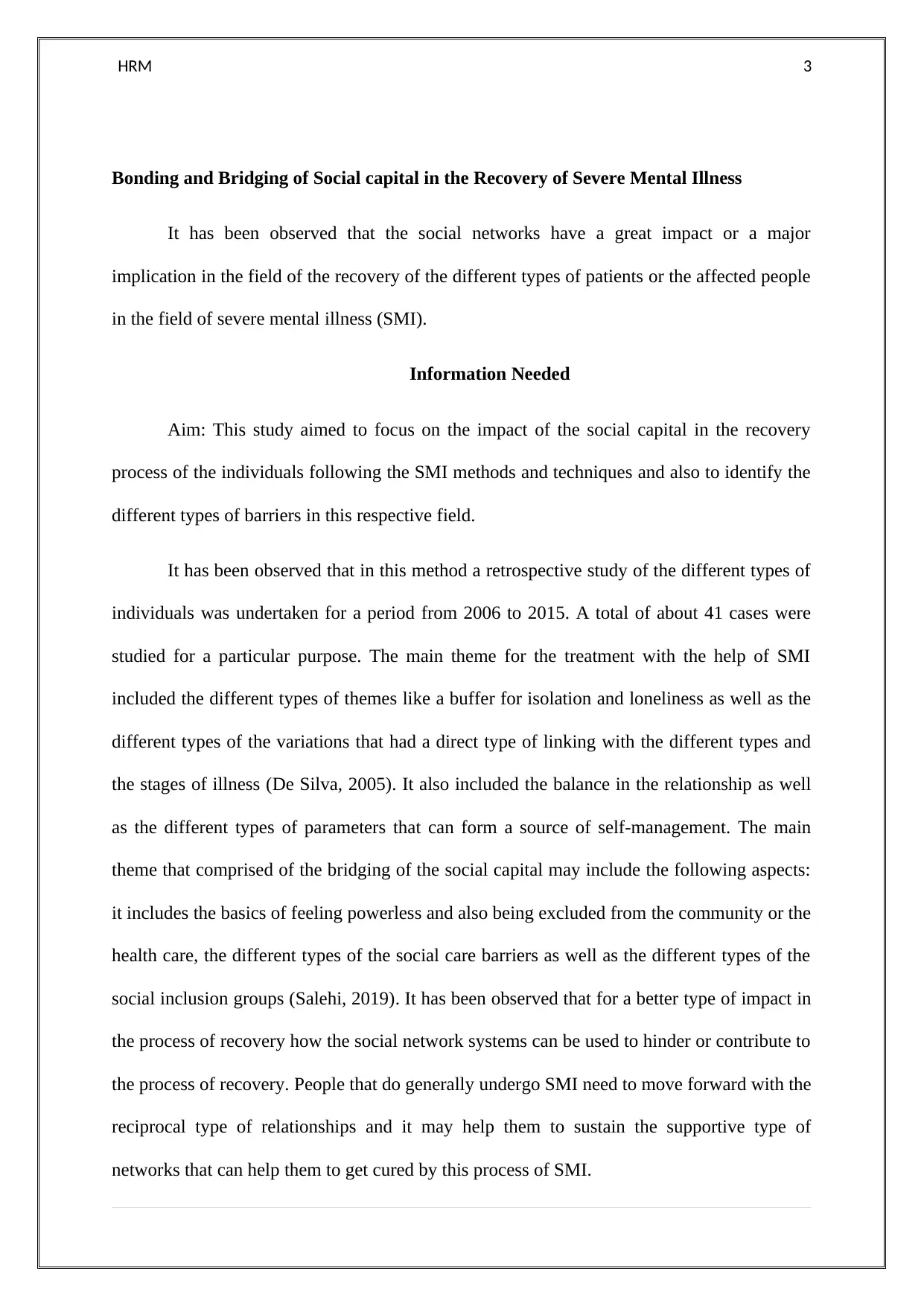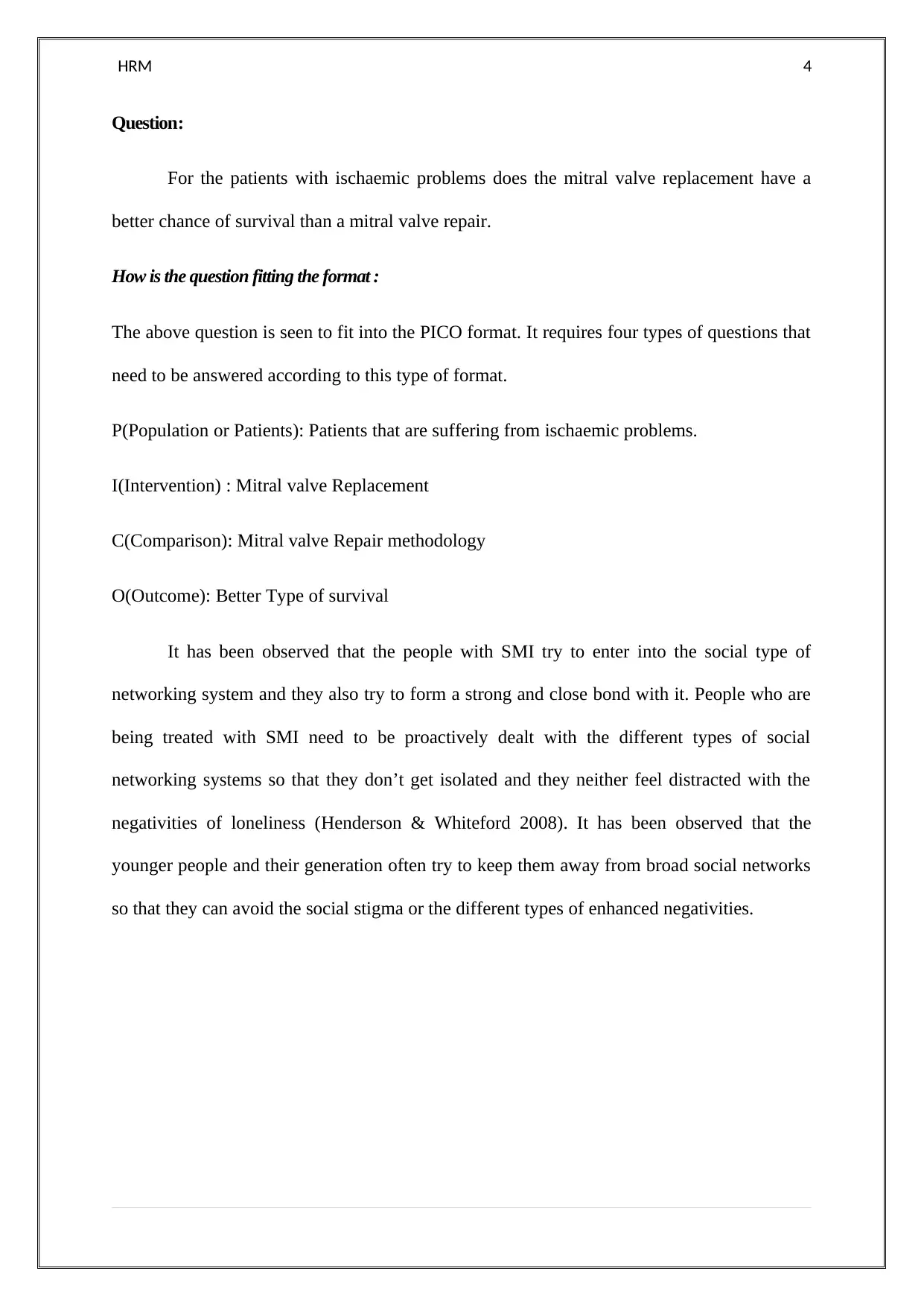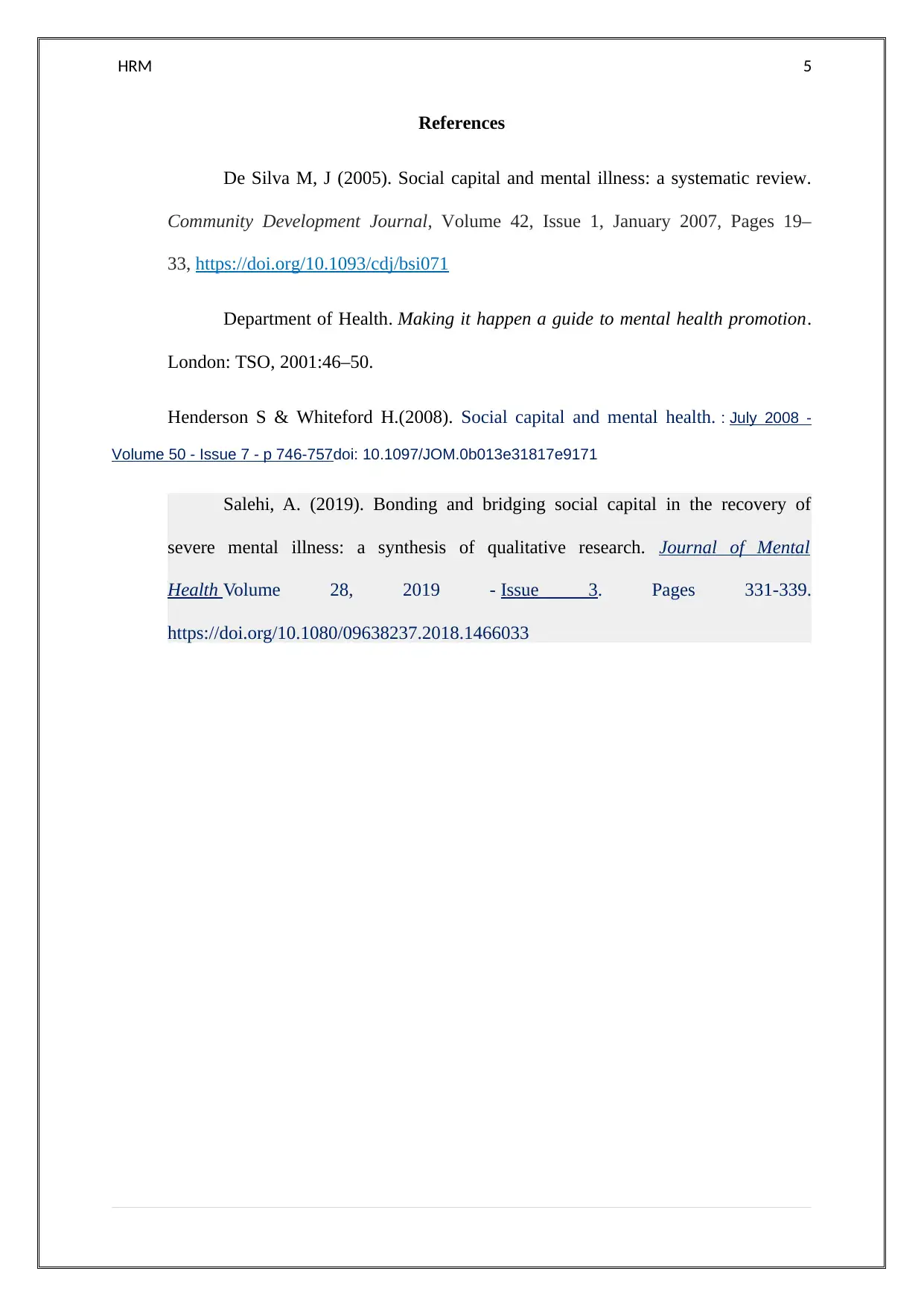Analysis of Social Capital in Severe Mental Illness Recovery Process
VerifiedAdded on 2022/08/18
|5
|898
|465
Report
AI Summary
This assignment investigates the significant impact of social capital on the recovery of individuals affected by severe mental illness (SMI). The study focuses on the methods and techniques used to leverage social networks in the recovery process. A retrospective analysis of 41 cases from 2006 to 2015 explores themes such as social isolation buffers, relationship balance, and self-management strategies. The research also examines the roles of bonding and bridging social capital, considering barriers like feelings of powerlessness and social exclusion. The report further addresses the PICO format question regarding mitral valve replacement versus repair for ischaemic patients, highlighting the importance of proactive social networking to prevent isolation and negativity. References include key publications on social capital and mental health.

Figures title: 1
ASSIGNMENT COVER SHEET
For use with online submission of assignments
Please complete all of the following details and then make this sheet the first page of each file
of your assignment – do not send it as a separate document.
Your assignments must be submitted as either Word documents, text documents with .rtf
extension or as .pdf documents. If you wish to submit in any other file format please discuss
this with your lecturer well before the assignment submission date.
Student Name:
Student ID No.:
Unit Name:
Unit Code:
Tutor’s name:
Assignment No.:
Assignment Title:
Due date:
Date submitted:
Declaration:
I have read and understand the Rules Relating to Awards (Rule 3 Section 18 – Academic
Misconduct Including Plagiarism) as contained in the SCU Policy Library.
I understand the penalties that apply for plagiarism and agree to be bound by these rules. The
work I am submitting electronically is entirely my own work.
Signed:
ASSIGNMENT COVER SHEET
For use with online submission of assignments
Please complete all of the following details and then make this sheet the first page of each file
of your assignment – do not send it as a separate document.
Your assignments must be submitted as either Word documents, text documents with .rtf
extension or as .pdf documents. If you wish to submit in any other file format please discuss
this with your lecturer well before the assignment submission date.
Student Name:
Student ID No.:
Unit Name:
Unit Code:
Tutor’s name:
Assignment No.:
Assignment Title:
Due date:
Date submitted:
Declaration:
I have read and understand the Rules Relating to Awards (Rule 3 Section 18 – Academic
Misconduct Including Plagiarism) as contained in the SCU Policy Library.
I understand the penalties that apply for plagiarism and agree to be bound by these rules. The
work I am submitting electronically is entirely my own work.
Signed:
Paraphrase This Document
Need a fresh take? Get an instant paraphrase of this document with our AI Paraphraser

Figures title: 2
(please type
your name)
Date:
(please type
your name)
Date:

HRM 3
Bonding and Bridging of Social capital in the Recovery of Severe Mental Illness
It has been observed that the social networks have a great impact or a major
implication in the field of the recovery of the different types of patients or the affected people
in the field of severe mental illness (SMI).
Information Needed
Aim: This study aimed to focus on the impact of the social capital in the recovery
process of the individuals following the SMI methods and techniques and also to identify the
different types of barriers in this respective field.
It has been observed that in this method a retrospective study of the different types of
individuals was undertaken for a period from 2006 to 2015. A total of about 41 cases were
studied for a particular purpose. The main theme for the treatment with the help of SMI
included the different types of themes like a buffer for isolation and loneliness as well as the
different types of the variations that had a direct type of linking with the different types and
the stages of illness (De Silva, 2005). It also included the balance in the relationship as well
as the different types of parameters that can form a source of self-management. The main
theme that comprised of the bridging of the social capital may include the following aspects:
it includes the basics of feeling powerless and also being excluded from the community or the
health care, the different types of the social care barriers as well as the different types of the
social inclusion groups (Salehi, 2019). It has been observed that for a better type of impact in
the process of recovery how the social network systems can be used to hinder or contribute to
the process of recovery. People that do generally undergo SMI need to move forward with the
reciprocal type of relationships and it may help them to sustain the supportive type of
networks that can help them to get cured by this process of SMI.
Bonding and Bridging of Social capital in the Recovery of Severe Mental Illness
It has been observed that the social networks have a great impact or a major
implication in the field of the recovery of the different types of patients or the affected people
in the field of severe mental illness (SMI).
Information Needed
Aim: This study aimed to focus on the impact of the social capital in the recovery
process of the individuals following the SMI methods and techniques and also to identify the
different types of barriers in this respective field.
It has been observed that in this method a retrospective study of the different types of
individuals was undertaken for a period from 2006 to 2015. A total of about 41 cases were
studied for a particular purpose. The main theme for the treatment with the help of SMI
included the different types of themes like a buffer for isolation and loneliness as well as the
different types of the variations that had a direct type of linking with the different types and
the stages of illness (De Silva, 2005). It also included the balance in the relationship as well
as the different types of parameters that can form a source of self-management. The main
theme that comprised of the bridging of the social capital may include the following aspects:
it includes the basics of feeling powerless and also being excluded from the community or the
health care, the different types of the social care barriers as well as the different types of the
social inclusion groups (Salehi, 2019). It has been observed that for a better type of impact in
the process of recovery how the social network systems can be used to hinder or contribute to
the process of recovery. People that do generally undergo SMI need to move forward with the
reciprocal type of relationships and it may help them to sustain the supportive type of
networks that can help them to get cured by this process of SMI.
⊘ This is a preview!⊘
Do you want full access?
Subscribe today to unlock all pages.

Trusted by 1+ million students worldwide

HRM 4
Question:
For the patients with ischaemic problems does the mitral valve replacement have a
better chance of survival than a mitral valve repair.
How is the question fitting the format :
The above question is seen to fit into the PICO format. It requires four types of questions that
need to be answered according to this type of format.
P(Population or Patients): Patients that are suffering from ischaemic problems.
I(Intervention) : Mitral valve Replacement
C(Comparison): Mitral valve Repair methodology
O(Outcome): Better Type of survival
It has been observed that the people with SMI try to enter into the social type of
networking system and they also try to form a strong and close bond with it. People who are
being treated with SMI need to be proactively dealt with the different types of social
networking systems so that they don’t get isolated and they neither feel distracted with the
negativities of loneliness (Henderson & Whiteford 2008). It has been observed that the
younger people and their generation often try to keep them away from broad social networks
so that they can avoid the social stigma or the different types of enhanced negativities.
Question:
For the patients with ischaemic problems does the mitral valve replacement have a
better chance of survival than a mitral valve repair.
How is the question fitting the format :
The above question is seen to fit into the PICO format. It requires four types of questions that
need to be answered according to this type of format.
P(Population or Patients): Patients that are suffering from ischaemic problems.
I(Intervention) : Mitral valve Replacement
C(Comparison): Mitral valve Repair methodology
O(Outcome): Better Type of survival
It has been observed that the people with SMI try to enter into the social type of
networking system and they also try to form a strong and close bond with it. People who are
being treated with SMI need to be proactively dealt with the different types of social
networking systems so that they don’t get isolated and they neither feel distracted with the
negativities of loneliness (Henderson & Whiteford 2008). It has been observed that the
younger people and their generation often try to keep them away from broad social networks
so that they can avoid the social stigma or the different types of enhanced negativities.
Paraphrase This Document
Need a fresh take? Get an instant paraphrase of this document with our AI Paraphraser

HRM 5
References
De Silva M, J (2005). Social capital and mental illness: a systematic review.
Community Development Journal, Volume 42, Issue 1, January 2007, Pages 19–
33, https://doi.org/10.1093/cdj/bsi071
Department of Health. Making it happen a guide to mental health promotion.
London: TSO, 2001:46–50.
Henderson S & Whiteford H.(2008). Social capital and mental health. : July 2008 -
Volume 50 - Issue 7 - p 746-757doi: 10.1097/JOM.0b013e31817e9171
Salehi, A. (2019). Bonding and bridging social capital in the recovery of
severe mental illness: a synthesis of qualitative research. Journal of Mental
Health Volume 28, 2019 - Issue 3. Pages 331-339.
https://doi.org/10.1080/09638237.2018.1466033
References
De Silva M, J (2005). Social capital and mental illness: a systematic review.
Community Development Journal, Volume 42, Issue 1, January 2007, Pages 19–
33, https://doi.org/10.1093/cdj/bsi071
Department of Health. Making it happen a guide to mental health promotion.
London: TSO, 2001:46–50.
Henderson S & Whiteford H.(2008). Social capital and mental health. : July 2008 -
Volume 50 - Issue 7 - p 746-757doi: 10.1097/JOM.0b013e31817e9171
Salehi, A. (2019). Bonding and bridging social capital in the recovery of
severe mental illness: a synthesis of qualitative research. Journal of Mental
Health Volume 28, 2019 - Issue 3. Pages 331-339.
https://doi.org/10.1080/09638237.2018.1466033
1 out of 5
Related Documents
Your All-in-One AI-Powered Toolkit for Academic Success.
+13062052269
info@desklib.com
Available 24*7 on WhatsApp / Email
![[object Object]](/_next/static/media/star-bottom.7253800d.svg)
Unlock your academic potential
Copyright © 2020–2025 A2Z Services. All Rights Reserved. Developed and managed by ZUCOL.


